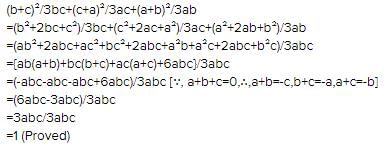Class 9 Exam > Class 9 Questions > If a b c=0 Then prove that (b c)^2/3bc (c a)^...
Start Learning for Free
If a b c=0 Then prove that (b c)^2/3bc (c a)^2/3ca (a b)^2/3ab=1?
Verified Answer
If a b c=0 Then prove that (b c)^2/3bc (c a)^2/3ca (a b)^2/3ab=1?

 This question is part of UPSC exam. View all Class 9 courses
This question is part of UPSC exam. View all Class 9 courses
Most Upvoted Answer
If a b c=0 Then prove that (b c)^2/3bc (c a)^2/3ca (a b)^2/3ab=1?
Proof:
Let's assume that a, b, and c are real numbers such that abc = 0.
Case 1: a = 0
If a = 0, then the expression (ab)^2/3ab = (0b)^2/3(0b) = 0/0. This is an indeterminate form, so we cannot determine its value.
Case 2: b = 0
If b = 0, then the expression (bc)^2/3bc = (0c)^2/3(0c) = 0/0. Again, this is an indeterminate form.
Case 3: c = 0
If c = 0, then the expression (ca)^2/3ca = (a0)^2/3(a0) = 0/0. Once more, this is an indeterminate form.
Case 4: Two of the variables are equal to 0
Without loss of generality, let's assume a = b = 0.
In this case, the expression (bc)^2/3bc (ca)^2/3ca (ab)^2/3ab = (00)^2/3(0c) (0c)^2/3(0c) (0b)^2/3(0b) = 0/0. Again, this is an indeterminate form.
Case 5: One variable is equal to 0
Without loss of generality, let's assume a = 0.
In this case, the expression (bc)^2/3bc (ca)^2/3ca (ab)^2/3ab = (b0)^2/3(b0) (0c)^2/3(0c) (0b)^2/3(0b) = 0/0, which is an indeterminate form.
Conclusion:
From the above cases, we can see that in all possible scenarios where at least one of the variables a, b, or c is equal to 0, the expression (bc)^2/3bc (ca)^2/3ca (ab)^2/3ab evaluates to an indeterminate form of 0/0. Therefore, we cannot conclude that the expression is equal to 1 when abc = 0.
Let's assume that a, b, and c are real numbers such that abc = 0.
Case 1: a = 0
If a = 0, then the expression (ab)^2/3ab = (0b)^2/3(0b) = 0/0. This is an indeterminate form, so we cannot determine its value.
Case 2: b = 0
If b = 0, then the expression (bc)^2/3bc = (0c)^2/3(0c) = 0/0. Again, this is an indeterminate form.
Case 3: c = 0
If c = 0, then the expression (ca)^2/3ca = (a0)^2/3(a0) = 0/0. Once more, this is an indeterminate form.
Case 4: Two of the variables are equal to 0
Without loss of generality, let's assume a = b = 0.
In this case, the expression (bc)^2/3bc (ca)^2/3ca (ab)^2/3ab = (00)^2/3(0c) (0c)^2/3(0c) (0b)^2/3(0b) = 0/0. Again, this is an indeterminate form.
Case 5: One variable is equal to 0
Without loss of generality, let's assume a = 0.
In this case, the expression (bc)^2/3bc (ca)^2/3ca (ab)^2/3ab = (b0)^2/3(b0) (0c)^2/3(0c) (0b)^2/3(0b) = 0/0, which is an indeterminate form.
Conclusion:
From the above cases, we can see that in all possible scenarios where at least one of the variables a, b, or c is equal to 0, the expression (bc)^2/3bc (ca)^2/3ca (ab)^2/3ab evaluates to an indeterminate form of 0/0. Therefore, we cannot conclude that the expression is equal to 1 when abc = 0.
Attention Class 9 Students!
To make sure you are not studying endlessly, EduRev has designed Class 9 study material, with Structured Courses, Videos, & Test Series. Plus get personalized analysis, doubt solving and improvement plans to achieve a great score in Class 9.

|
Explore Courses for Class 9 exam
|

|
Similar Class 9 Doubts
If a b c=0 Then prove that (b c)^2/3bc (c a)^2/3ca (a b)^2/3ab=1?
Question Description
If a b c=0 Then prove that (b c)^2/3bc (c a)^2/3ca (a b)^2/3ab=1? for Class 9 2024 is part of Class 9 preparation. The Question and answers have been prepared according to the Class 9 exam syllabus. Information about If a b c=0 Then prove that (b c)^2/3bc (c a)^2/3ca (a b)^2/3ab=1? covers all topics & solutions for Class 9 2024 Exam. Find important definitions, questions, meanings, examples, exercises and tests below for If a b c=0 Then prove that (b c)^2/3bc (c a)^2/3ca (a b)^2/3ab=1?.
If a b c=0 Then prove that (b c)^2/3bc (c a)^2/3ca (a b)^2/3ab=1? for Class 9 2024 is part of Class 9 preparation. The Question and answers have been prepared according to the Class 9 exam syllabus. Information about If a b c=0 Then prove that (b c)^2/3bc (c a)^2/3ca (a b)^2/3ab=1? covers all topics & solutions for Class 9 2024 Exam. Find important definitions, questions, meanings, examples, exercises and tests below for If a b c=0 Then prove that (b c)^2/3bc (c a)^2/3ca (a b)^2/3ab=1?.
Solutions for If a b c=0 Then prove that (b c)^2/3bc (c a)^2/3ca (a b)^2/3ab=1? in English & in Hindi are available as part of our courses for Class 9.
Download more important topics, notes, lectures and mock test series for Class 9 Exam by signing up for free.
Here you can find the meaning of If a b c=0 Then prove that (b c)^2/3bc (c a)^2/3ca (a b)^2/3ab=1? defined & explained in the simplest way possible. Besides giving the explanation of
If a b c=0 Then prove that (b c)^2/3bc (c a)^2/3ca (a b)^2/3ab=1?, a detailed solution for If a b c=0 Then prove that (b c)^2/3bc (c a)^2/3ca (a b)^2/3ab=1? has been provided alongside types of If a b c=0 Then prove that (b c)^2/3bc (c a)^2/3ca (a b)^2/3ab=1? theory, EduRev gives you an
ample number of questions to practice If a b c=0 Then prove that (b c)^2/3bc (c a)^2/3ca (a b)^2/3ab=1? tests, examples and also practice Class 9 tests.

|
Explore Courses for Class 9 exam
|

|
Suggested Free Tests
Test: The Fundamental Unit of Life- Case Based Type Questions- 1
Test | 10 questions
Signup for Free!
Signup to see your scores go up within 7 days! Learn & Practice with 1000+ FREE Notes, Videos & Tests.

























